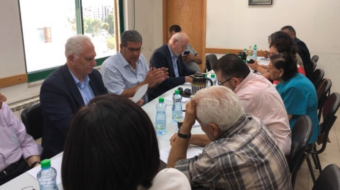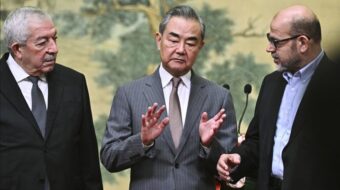
MOBILE, Ala. — I joined more than 150 Iraq war veterans, Vets for Peace and Gold Star parents together with Hurricane Katrina survivors beginning a 138-mile march from here to New Orleans, March 14. They accused the Bush administration of wasting $250 billion in tax dollars in Iraq, money desperately needed to rebuild the still devastated Gulf Coast.
As we trekked west along Coastal Highway 90, veterans carried a banner that read, “Every bomb dropped in Iraq explodes over New Orleans.” Another proclaimed, “Bring the troops home now.” Many marchers carried signs reading, “Bush, step down.” Painted in giant letters on the side of the Vets for Peace school bus accompanying the marchers was the message, “Impeach Bush.”
The march, due to arrive in New Orleans March 19, is co-sponsored by Iraq Veterans Against the War, Veterans for Peace, Gold Star Families for Peace, Military Families Speak Out and a number of Katrina survivor groups. The action is a dramatic high point of hundreds of rallies, vigils and marches across the nation on the war’s third anniversary.
Kelly Dougherty, a founding member of IVAW who served for 10 months as an MP in Nasiriyah, Iraq, told me, “After the hurricane, I was shocked at the government’s failed response. I want to call attention to the fact that billions of our tax dollars go for the war on Iraq and the people of this area devastated by hurricanes have been ignored.”
During her tour in Iraq, she added, “I saw no improvement in the lives of the Iraqi people. On the contrary, I saw a lot of violence inflicted upon them by the occupation forces. I want victims of Katrina to know I stand in solidarity with them in calling for the right to rebuild and have democratic control over rebuilding their communities.”
Sgt. 1st Class John L. Robinson, a 24-year Army veteran, told me his wife is currently deployed in Iraq. “I’m here to show my support for my wife and the families of soldiers killed in Iraq,” he said. “I want the people of America to know it is past time to bring our people home so we can start fixing America.”
Robinson didn’t have far to travel to get back home. We camped the night of March 14 on his mother’s property just outside Irvington, Ala. His mom, Mamie Mackey, was a very gracious hostess. She operates a home for mentally disabled people. We held a candlelight vigil on her place and many of the people who live in her home joined us to protest the war.
Also joining us were Katrina survivors from the coastal town of Coden. The mostly Black town remains uninhabitable six months after Katrina with no government plans to help residents return and rebuild.
Coden resident Ernestine T.T. Williams said she has been forced to move three times since her home was destroyed. “It hurts that we have lost our homes but it is worse that we have lost our family and friends not only to death but to displacement,” she said. “It’s hard staying in hotels and motels, forced to move so many times. We thank the veterans for coming here to Coden. FEMA never came. Our own representatives in Congress never came.”
Later, I joined a team traveling down to Coden to survey the devastation. The town is destroyed, but the site has breathtaking views out over the Gulf, property that real estate developers drool to get their hands on to gentrify.
A spirit of welcome greeted us from the moment we arrived in Alabama. We stayed at a warehouse just outside Mobile the evening of March 13. Hurricane relief volunteers, members of “Save Our Selves,” affiliated with the Stone Baptist Church in Mobile, had grills blazing and served us chicken, green beans and potatoes in the finest tradition of Southern cooking and hospitality.
One of the volunteers, Erlean Baldwin of Mobile, told me, “We have been feeding people, taking calls, providing community services since Hurricane Katrina hit. We are struggling to obtain food and supplies. The need is as urgent now as it ever was. We have received no government assistance. We rely solely on prayers and the generosity of the people.”
Last night I was on KP, scrubbing pots and pans. It felt like I was back in the Army. The temperature fell below freezing and I was thankful I came with my Army cold weather sleeping bag since we were bivouacked in an open field.
Gold Star father Bill Mitchell traveled here from Atascadero, Calif., to join the march. He is still mourning the loss of his son, Sgt. Mike Mitchell, who died in Baghdad’s Sadr City on April 4, 2004. “All of us have to connect the dots,” he told me. “As we wage illegal and costly wars in foreign lands, the living conditions of average people at home continue to deteriorate.”
Morgan Wheeler is a U.S. Army veteran, a member of the Baltimore Chapter, Veterans for Peace, and a member of Local 24, International Brotherhood of Electrical Workers.











Comments